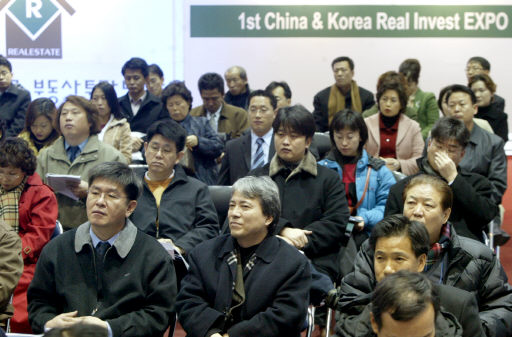Posted on : May.19,2006 10:25 KST
Modified on : May.19,2006 12:21 KST
 |
|
As foreign exchange is deregulated ahead of schedule, purchases of foreign real estate are expected to rise.
|
Measure could also prevent burst of domestic housing bubble
The purchase of overseas real estate for investment purposes is expected to be allowed two years earlier than originally scheduled, according to the government’s recently announced foreign exchange liberalization plan. The new measure aims to put the brakes on the won’s rapid ascent against the dollar, but some experts forecast that it will also have a positive influence on the stabilization of housing prices in Seoul’s Gangnam district.
Will investment in overseas real estate surge?
Due to the measure, people whose children study abroad are more likely to buy overseas real estate for both residential and investment purposes, observers predict. These purchases are currently allowed for official residential purposes alone. With this revision of governmental real-estate policy, foreign property is expected to become a very attractive alternative investment.
“Since the government announced the new measure, we have received an increasing number of phone calls asking for information," said Im Chae-gwang of Rootiz Korea, an investment company specializing in overseas real estate. "There were already many people seeking information about overseas real estate, but the number of investments in real estate abroad will increase exponentially.”
According to Rootiz, the current glut of short-term floating funds allows serious investors to make as many purchases overseas as they would like. Rootiz already has plans to jump into this newly emergent sub-market by organizing a small real-estate investment fund.
Gwon Yong-gyu, an official of Woori Bank, said, “A majority of investors are interested in real estate costing between 500,000 and 1 million USD, so the [government’s 1 million USD] ceiling for investment isn’t really a concern.”
Killing two birds with one stone
The government announced its new measure at a time when the won’s rapid growth against the dollar and the burst of the property market bubble in the Gangnam area have become hot-button issues. The government expects its measure to help stabilize the foreign exchange rate by incurring a deficit in the capital account. But with the volume of South Korea’s foreign exchange market reaching 29 billion USD a day and the foreign exchange liberalization slated to develop the market continuously, the effect of overseas real estate purchases on won-dollar fluctuation will be limited, some experts noted. Others thought the purchases will bear greater influence on the domestic real estate market. “It may be a more effective way to stabilize property prices in the Gangnam area than the comprehensive real estate tax,” one real-estate industry expert said.
However, now that the real-estate bubble in the U.S. is collapsing, investors have been warned to observe caution. Additionally, analysts say that the new measures may be misused by those wishing to avoid taxation in cases of large gifts and inheritance.

